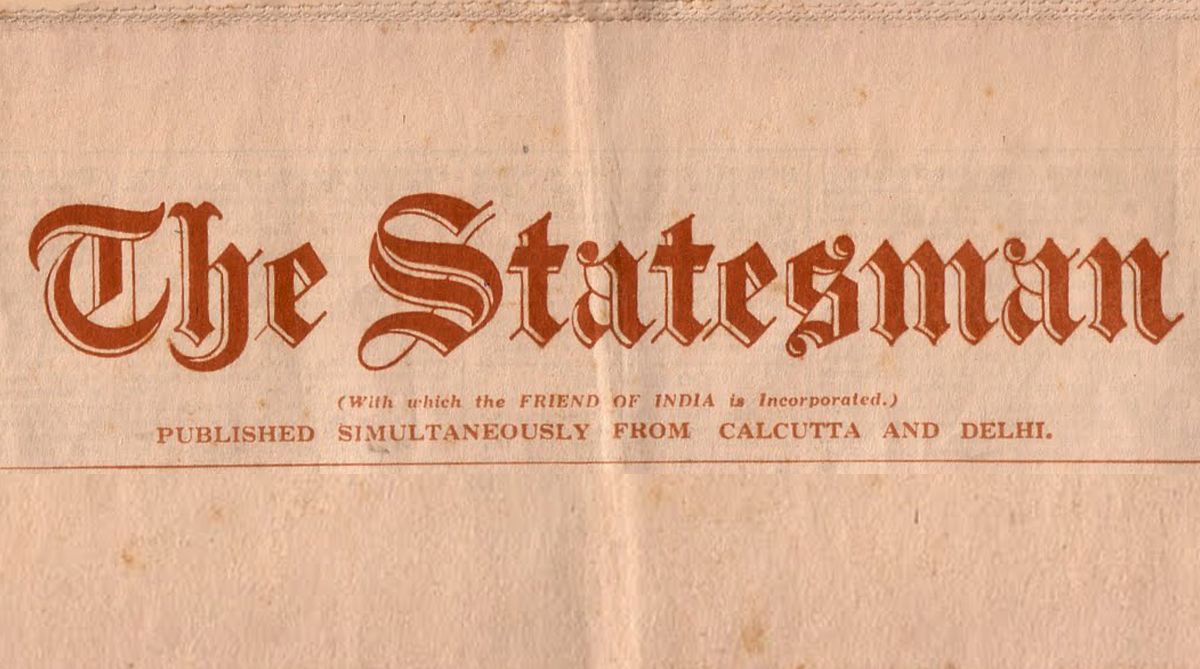Air India Plane Crash: Aviation Expert Amit Singh discusses investigating the cause and restoring public confidence
Captain Amit Singh, founder - Safety Matters Foundation, is a former head of airline flight operations and safety.
On this day a century ago, these were some of the news items The Statesman readers got to read about India and the world.
Statesman News Service | New Delhi | September 28, 2018 2:42 am

OCCASIONAL NOTE
The Resolution issued by the Bengal Government on the subject of the riots in Calcutta on September 9 and 10 gives a clear and judicial account of the disturbances and their origin. The only matter on which the policy of the Government has been seriously attacked is the prohibition of the mass meeting which had been convened. The explanation of the reasons which necessitated this step will satisfy anyone whose mind is open to conviction that the Government would have exposed Calcutta to grave danger if they had permitted a mass assembly in which harangues were to be delivered on religious grievances.
Advertisement
The narrative of the riots shows that no force was used except when it was absolutely necessary to check violent mobs. The alleged intrusion of soldiers into the Nakhoda mosque was the subject of a military court of inquiry which found that the mosque was not entered. The list of casualties was, in the circumstances, small. The heaviest loss of life was occasioned by the attempt of a mob, some thousands strong, to march from Garden Reach into Calcutta. Mr. Sturgis and two military officers made every effort, at the risk of their lives, to induce the crowd to disperse, and a clear proof of the necessity of firing on the mob is the fact that the order had to be given while British officers were still in the midst of the rioters. The whole trouble was largely caused by foreign agitators who have now been removed from Bengal. For its suppression the credit is mainly due to the tact and firmness of Mr. Clarke, the Commissioner of Police.
Advertisement
INDUCING COOLIES TO STRIKE
The case under the Defence of India Act Rules against four Indians for inducing wharf coolies to strike came on today, having been adjourned to enable the Government Advocate to deal with the question of jurisdiction. The Government Advocate refuted the view of counsel for the defence on the jurisdiction question that his argument would reduce the C.P.C. to an absurdity as all cases of murder, dacoity, etc., would have to be tried by special tribunals.
In opening the case the Government Advocate quoted the Lord Chief Justice of England on the duty laid upon courts to give effect to the purpose of war legislation, which is to prevent anyone giving aid to the enemy and to punish those convicted of so doing. In the case of question railway sleepers were lying at the wharf in readiness to be loaded, and the accused persuading the coolies not to work were delaying the arrival of the sleepers at the place where they were required. Their offence lay in advising the coolies to go away and wait until the shipping people, which included the Government, would give them two rupees a day, which was an exorbitant demand as they had only been getting one rupee, one anna a day previously. The case is proceeding.
PROGRESS AT ALL POINTS
A French Eastern communiqué says: The operations were particularly successful. The formidable Belashitza mountains have been captured. The British army has crossed the Bulgarian frontier at Kosturine and is marching on Strumnitza. The heights of Graditz and Prania have been reached by the French, Greeks and Serbians and captured. They have advanced beyond Ishtip and are now approaching Veles. The enemy has been forced to evacuate positions north-west of Monastir. The Allies are threatening them towards the north throwing them back in Albania. Some prisoners belonging to the Allies have been released and numerous more guns and prisoners captured, also considerable booty. Up to the present over 10,000 prisoners and 200 guns have been counted.
BRITISH GAINS
We successfully continued local operations during the afternoon and night north-westwards of St. Quentin. The English progressed and captured certain strongly protected localities in the neighbourhoods of Selency and Gricourt and took a number of prisoners. Besides the counter-attacks launched by the enemy north-westwards of Fayet, he also twice unsuccessfully attacked us northward of Gricourt. The English by a successful minor operation north-westward of La Bassee advanced their line and took over one hundred prisoners. We repulsed a counter-attack in this locality at night, taking several prisoners. We improved our positions slightly north-westward of Armentieres and took several prisoners in patrol encounters and raids between Armentieres and Ypres.
Advertisement
Captain Amit Singh, founder - Safety Matters Foundation, is a former head of airline flight operations and safety.
The country has a failed defence and foreign policy and is floundering here and there like a beggar,'' he said in an interview with The Statesman.
Sawant is part of the Parliamentary Standing Committee on External Affairs and was among the MPs who were briefed by Foreign Secretary Vikram Misri on Operation Sindoor
Advertisement
